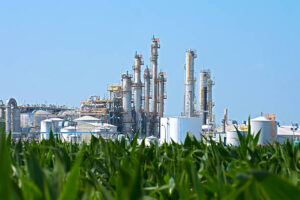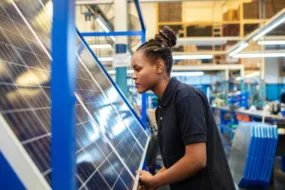Biofuel Blends:

Climate change is a result of burning fossil fuels such as coal, oil, and gas. This is a major issue that our planet is currently facing. Climate change disrupts weather patterns, raises sea levels, and threatens ecosystems worldwide. But there’s hope! Biofuels are emerging as a powerful weapon in the fight against climate change, offering a cleaner and more sustainable alternative to traditional fuels.
What are biofuel blends?
Biofuel blends are a broad category of liquid fuels derived from organic materials known as biomass. Biomass can include:
1. Plants (corn, sugarcane, switchgrass)
2. Algae
3. Used cooking oil
4. Animal fats
5. Municipal solid waste (food scraps, yard waste)
Here’s a breakdown of the two main types of biofuels:
1. Bioethanol is made from fermented sugars in crops like corn or sugarcane. It’s blended with gasoline to power vehicles.
2. Biodiesel is produced from vegetable oils, animal fats, or cooking oil. It can be used directly in diesel engines or blended with regular diesel fuel.
Read More: Exploring Quirky Sustainable Energy Solutions
How Can Biofuel Blends Fight Climate Change?

Biofuels offer a significant advantage over fossil fuels: their carbon cycle. As they grow, plants absorb carbon dioxide (CO2), a key greenhouse gas (GHG). When we burn biofuels, the CO2 released is roughly equal to the amount the plants absorb, creating a near-closed loop. This significantly reduces overall net emissions compared to traditional fossil fuels. Here are some of the advantages of biofuel over fossil fuels when it comes to climate change:
1. Reduced greenhouse gas emissions: When burned, biofuels release carbon dioxide (CO2), a greenhouse gas. However, the plants used to create biofuels absorb CO2 from the atmosphere as they grow, creating a near-closed loop. This significantly reduces the overall net CO2 emissions compared to fossil fuels.
2. Renewable Source: Unlike fossil fuels, which are finite resources, biofuels can be continuously produced from sustainable feedstocks (raw materials). This ensures long-term energy security and reduces dependence on dwindling oil reserves.
3. Cleaner Burning: Biofuels generally burn cleaner than fossil fuels, releasing fewer harmful pollutants like particulate matter and sulphur oxides. This translates to cleaner air and improved public health.
The Potential Impact of Biofuel Blends
The potential impact of biofuels on climate change is significant. Studies suggest that the widespread use of biofuels could reduce greenhouse gas emissions from transportation by up to 80%. This translates to a dramatic slowdown in global warming and its associated environmental consequences.
Here are some real-world examples of biofuels making a difference:
1. Brazil: A global leader in bioethanol production, Brazil has significantly reduced its reliance on fossil fuels and lowered its greenhouse gas emissions.
2. Europe: The European Union has set ambitious targets for biofuel use, aiming to replace a significant portion of fossil fuels with biofuels by 2030.
3. The United States: The U.S. has a growing biofuel industry, with corn ethanol being a common biofuel blend in gasoline.
Challenges and Considerations

While biofuels hold immense promise, there are some challenges to address:
1. Feedstock Production: Large-scale biofuel production requires significant land for growing crops. This can raise concerns about competition with food production and potential deforestation.
2. Sustainability Practices: To maximise the environmental benefits, biofuel production needs to be sustainable. Practices like using marginal lands and utilising waste materials are crucial.
3. Technological Advancements: Continued research and development are needed to improve biofuel efficiency, reduce production costs, and explore new feedstocks.
Exploring the Future of Biofuel Blends
Biofuel technology is rapidly advancing. Here are some exciting developments:
1. Advanced Biofuels: Next-generation biofuels, produced from algae or woody biomass, offer even lower emissions and higher efficiency.
2. Cellulosic Biofuels: These biofuels are derived from the non-edible parts of plants, like stalks and leaves, minimising competition with food production.
3. Biorefineries: These facilities are designed to process biomass into a variety of biofuels and bioproducts, maximising resource utilisation.
Read More: Energy Efficiency: Why Your Business Needs It
Biofuels: A Career Path for Sustainability Champions

The biofuel industry is brimming with opportunities for passionate individuals who want to make a difference. From research scientists developing innovative biofuel production methods to engineers designing efficient biorefineries, there are roles for everyone.
Become part of the solution.
By supporting the development and use of biofuels, we can collectively contribute to a cleaner and more sustainable future. Here’s what you can do:
1. Advocate for Biofuels: Talk to your local representatives about policies that encourage biofuel production and use.
2. Choose Biofuel Options: When available, opt for biofuel blends at gas stations or support businesses that use biofuels.
3. Reduce Your Carbon Footprint: Conserve energy at home, choose sustainable transportation options, and support companies committed to renewable energy.
4. Stay Informed: Keep yourself updated on the latest advancements in biofuel technology and share this knowledge with others.
Read More: An Overview of Sustainable Energy Investments
Conclusion
Biofuels are not a silver bullet, but they offer a powerful tool in the fight against climate change. By harnessing the power of renewable resources, biofuels can create a cleaner, more sustainable future for generations to come. Biofuels are not just a potential solution; they are actively being developed and implemented. By embracing innovation, addressing challenges responsibly, and taking individual action, we can make biofuels the key to unlocking a cleaner, more sustainable future for our planet.










